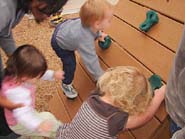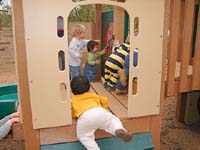TEMPLE PRESCHOOL
5015 HARDING ROAD, NASHVILLE, TN 37205
PHONE (615) 356-8009
FAX (615) 352-9365
E-mail
[email protected]
Corye E. Nelson, Director
Program Philosophy
The philosophy of the Temple Preschool program is based on the belief that each child is unique and will develop at his/her own rate. Under the guidance of caring teachers, children may pursue individual interests as well as participate in group activities. The Temple Preschool philosophy and curriculum are based on the National Association of the Education of Young Children’s (NAEYC) guidelines of developmentally appropriate practices and the TN. Dept. of Human Services Star-quality program. (We are nationally accredited and have a three star rating from the state of Tennessee.)
Mission Statement
Our mission is to enable, empower, and encourage each child to develop physically, socially, cognitively, and spiritually to his/her fullest potential in a nurturing, Jewish environment. Our first priority is to foster your child's development in our stimulating, play based environment. We strive to build a community where each child knows s/he belongs, feels safe, and feels s/he makes an important contribution. Our emergent curriculum provides hands-on experiences with math concepts, science, language, music, art, cooking and information technology. (Pre- K).
Regarding our Jewish Curriculum
We provide developmentally appropriate materials, environments, and activities to encourage young minds and bodies to grow. We also understand the importance of rituals, family, community, caring for others and the Earth and how these values help create a caring and compassionate person. Therefore, we provide weekly experiences with Shabbat (the Jewish day of rest starting at sundown on Friday night and lasting until sundown Saturday), symbols, Hebrew prayers, music and dance, celebrations and special foods. Our Judaica coordinator prepares enrichment activities such as baking Challahs (a special white egg bread eaten on Shabbat), making prayer books, and a variety of holiday activities. In addition, each family has turns participating with our weekly Shabbat basket and/or Tzedakah bear.
About the Staff
Our teachers provide a nurturing, loving environment for the children. The majority of our staff holds college degrees. Two have their master’s degree and one is a nurse. Several of our teachers are multi-lingual. Each staff member receives at least 18 hours annually of continuing professional development and is trained every two years in CPR and First Aid.
Activities
We offer multicultural education, programming with experts in a variety of fields, intergenerational experiences, and every day opportunities to celebrate the Jewish heritage. We have regular contracts with “MusicStar” (a multicultural music experience) and with “Kidskills” (a creative movement class). The infants, along with their teachers and parents, are introduced to sign language.
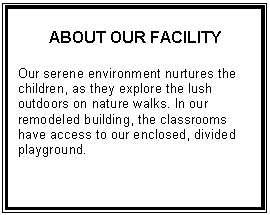
REGISTRATION
The school’s year starts in August and goes through July. Continuing registration begins each year in January. First, children presently attending the preschool are processed in the order by the date the application is received in the office. Next, siblings and Temple members are accepted. After that, new enrollments will be processed from our wait list. Priority will be given to children in the Jewish community, followed by children from the general community. There shall be no admission discrimination on the basis of race, color, creed, national origin, religion, or sex. Prospective parents must schedule a program visit before applying for the wait list and must pay a non-refundable registration fee with their application. This does not guarantee placement. When a space becomes available, a non-refundable deposit will hold the space for two weeks, after which regular tuition payments must begin. This deposit will be applied toward tuition fees.
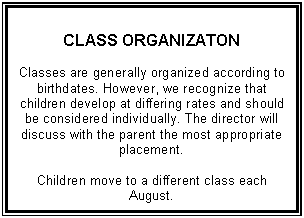
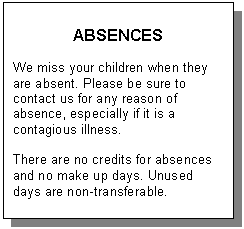

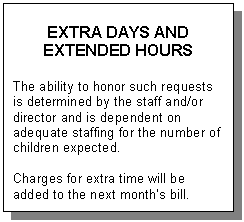
SNOW POLICY/EMERGENCY SITUATIONS
Our goal is to remain open when at all possible. The decision to open or close will be made by the Director in consultation with the Senior Rabbi. This decision will be based on whether sufficient staff is able to report for work and the condition of the parking lot. One of three decisions may be made: 1) to open at 9:00 a.m., 2) to close completely, 3) to close early, or 4) we will open at regular hours. Our policy is to provide as many hours of service as we safely can. Announcements for closing will be given on T.V. (Channels 2,4 & 5). Staff will attempt to call families who usually arrive at school before 8:00 a.m..
EMERGENCY PLAN
Each classroom is equipped with basic first aid and minimal supplies in the event of a disaster. Monthly fire drills and escape plans are conducted as well as regular tornado drills. In the event of an evacuation, we will be directed to move to the farthest area of the parking lot, toward the Belle Meade Mansion. Most entrances are closed off when a security threat is raised, in which case, the main Temple entrance under the portico will be the way to enter. (There is an elevator near that entrance).
The Temple’s complete Emergency Safety Guidelines document is available in the office for your perusal.
CLASSROOM MANAGEMENT
We use positive reinforcement, modeling, and appropriate intervention during conflict to teach desired behavior in a calm, respectful manner. The discipline administered by the preschool will be limited to redirection and time out. "Time out" means a child exhibiting inappropriate behavior will be removed from the activity for a short period of time. If there are on-going difficulties, we will contact parents and outside resources for further intervention. SEE ALSO PAGES 13 AND 14.
COMMUNICATION POLICY
We believe the best learning environment is one in which parents, teachers, and the director actively work together. Here are some of the ways (formal and informal) in which you and the preschool staff can establish an on-going dialogue and relationship.
1. A PARENT ORIENTATION is held in early August before the school year begins. This most important program is for all parents, returning and new. Every parent is urged to attend. Child care is provided. This program includes a review of the policies, procedures, and philosophy of the preschool. Staff and programs will be introduced. Next, you will get to visit your child’s new classroom and meet with his/her teachers. They will explain their program, and the basics – like what to do upon arrival and departure so that your child’s transition will be as smooth as possible.
2. DAILY COMMUNICATION consists of individual notes for children in infant and toddler classrooms. Preschool classrooms write a daily re-cap and post it on the door. All notes are written during nap time, and do not always include the end of the day experiences. Teachers will complete an incident report or make phone calls as needed regarding concerns, injuries, and illnesses, and a copy will be made for all parties involved as well as the office. Teachers make an effort to speak to you briefly about your child’s day; however, their first priority is to supervise the children. Therefore, extensive conversations need to occur during nap times or by scheduled appointment. The preschool recognizes that responsibility for communication is shared by school and family. Concerns may be made by phone call, email or note to the teacher or director.
3. PARENT-TEACHER CONFERENCES are scheduled twice each year, usually in the fall and spring. You may schedule a conference at any time.
4. THE preschool ADVISORY COMMITTEE helps set policies and procedures and reports directly to the Temple Board. This committee is made up of Temple members, parents and community professionals.
5. THE PARENT COMMITTEE is composed of parents from each classroom. This committee is a liaison between the director and the parents. This committee meets once each month and coordinates many worthwhile special projects such as picnics, holiday celebrations, graduation ceremony, teacher appreciation and various fundraising projects.
6. FUNDRAISING PROJECTS provide an avenue for every parent to get involved, and we strongly urge all to participate. The money from these efforts is used to purchase additional equipment, toy replacement, program enhancement, and for staff training. While the preschool fees cover the operating costs, substantial improvements require additional funds. It is our expectation that every family will contribute to our fundraising efforts at least once during each year (i.e. - donating to the Chanukah Fund, baking for the Purim Bake Sale, etc.) We feel that the money benefits all the children and a successful fundraiser needs every family’s support.
7. PARENTS ARE REQUESTED to assist with all our special programs such as the Chanukah Party, Model Seder, or the Purim Carnival. This allows the teachers to guide, supervise and help the children. It is fun and a great way to meet other parents.
8. PARENTS/ GRANDPARENTS ARE INVITED to do a special project with the children or to share information about your hobby, career, or travels. Please arrange this with the classroom teacher at your mutual convenience.
All families are invited to our Friday morning Shabbat service (10:00 AM), especially the week of your child’s birthday.
9. OUR MONTHLY COMMUNICATION includes an article in the Temple’s bulletin (The View) that each parent receives by US mail. If this is not coming to your home, please notify our office.
10. COMMUNICATIONS are sent to you via your child’s mailbox. Please check this box DAILY for field trip permission forms, monthly statements, notes from teachers, newsletters, snack calendar, etc.
11. BIRTHDAY INVITATIONS AND THANK YOU NOTES sent through classroom mail should go to all children.
12. GRIEVANCES are a natural part of any community. Collaboration and two-way communication between the school and parents is essential to support student learning. Issues regarding all children, staff, or other parents should be addressed immediately and directly. It is our hope that teachers will be your first contact when the concern is with that specific teacher or classroom. We recognize that this could be uncomfortable; therefore, a three-way conference (teacher, director and parent) could be arranged. The teacher and director will follow up to see that the issue is satisfactorily resolved. If the situation is not resolved, our committee chair, Frances Mazer, ([email protected]) will field any concerns or direct them to the Senior Rabbi, Mark Schiftan (352-7620 ext.222). We encourage you to partner with the school to provide the best care for your children. Please also see PAGE 14.
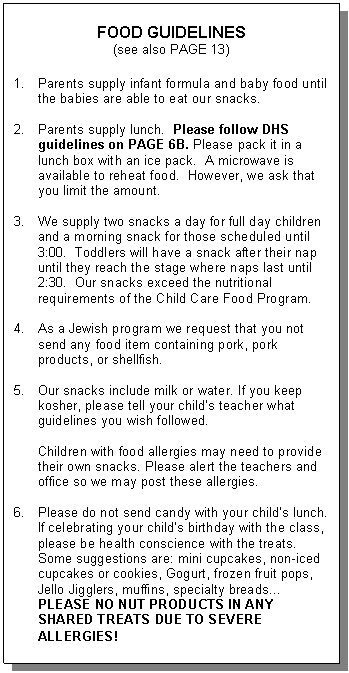
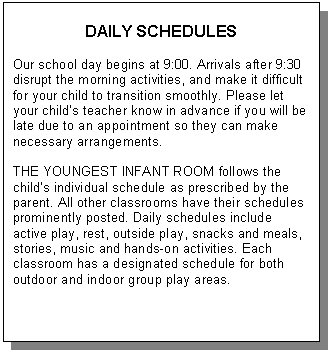
TOILET TRAINING
The parents and teachers will develop a mutual agreement and partnership for this important life skill for your child.
WHAT TO BRING
A complete change of clothes: pants, shirt, socks, underwear and sneakers to leave at school. (Please send several changes of clothing if your child is being potty trained.) If we use them, please return a new set of clothes the next time your child attends school.
-
A FITTED CRIB SIZE SHEET and a small light-weight blanket or large bath or beach towel. We request this size so that they fit the mats and will fit easily in the small cubbie baskets. We send these items home at the end of each week to be laundered. Please return them the next day your child comes.
-
A “lovey” if your child requires one for nap time.
-
Disposable diapers (if needed). Keep at least an extra day’s supply at school. You may bring them in by the bag if you wish. For health and sanitation reasons, we require the use of disposable diapers (instead of cloth) while children are in our care.
-
Food AND/OR BOTTLES – refer to the food guidelines. See PAGES 6, 6B, and 13.
-
It is helpful to keep extra supplies stocked in the event we need to implement our emergency plan.
LABEL EVERYTHING !
WHAT NOT TO BRING
-
TOYS FROM HOME: Children have difficulty sharing special toys, creating many stressful situations. Should a toy get lost or broken the result is a very unhappy child. A “lovey” for nap is okay. We especially discourage toys that encourage aggressive play/violent themes.
-
CANDY: Due to choking hazards and allergies, we ask that it not be brought at all.
-
VIDEOS: We stress interactive play materials and limit the use of videos to a special activity on a rainy day, or videos about a topic of study, or storybooks on video that are also read in class. If you have a video you think might be appropriate, talk with your child’s teacher before suggesting it to your child. When a video is used, parents will be asked to sign a permission form prior to the viewing.
WHAT TO WEAR
Inexpensive play clothes that can get accidentally stained or bleached and clothes that are appropriate for the weather are best choices for what to wear. We go outside every day. In winter, children need long pants, mittens, hats and boots. The children remain healthier when they have daily outside time, even in winter. Those that are being potty trained should wear clothes that are easy for the child to remove (such as elastic waistbands instead of zippers / buttons). PLEASE APPLY SUNSCREEN BEFORE COMING TO SCHOOL. Teachers will reapply as needed. Parent permission is required on the classroom form.
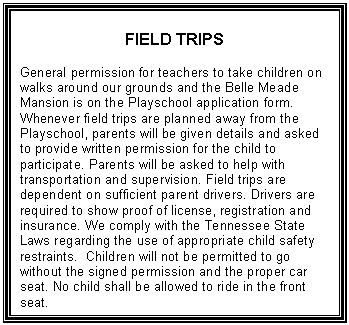
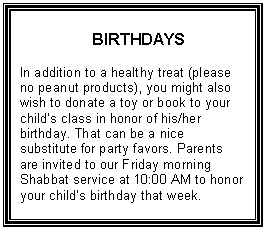
ARRIVAL, DEPARTURE, PARKING
The safety of the children is of utmost importance. In an effort to insure a safe arrival and departure, we ask that you follow the procedures listed below.
- Use the drop-off area in front of our building for quick drop off and pick up (5 minutes or less). If it takes time to settle your children in, please park in the parking lot. If you are in a big hurry, it is advisable to park in the lot unless you are the first car in the circle.
- When entering the drop-off area, always pull all the way into the circle as far to the opposite end and as close to the curb as possible. Please do not block traffic by parking in the fire lane or near the traffic cones.
- ALWAYS LOCK YOUR CAR AND TURN OFF YOUR IGNITION. NEVER LEAVE CHILDREN OR PURSES IN YOUR CAR.
- Hold your child’s hand so that he/she cannot dart out in front of a car.
- SPEED LIMIT UPON ENTERING TEMPLE PROPERTY IS 15 MILES PER HOUR.
- It is the preschool’s policy and DHS requirement that we not allow children to be released to anyone whose behavior may place the children in immediate risk (i.e. intoxication, lack of proper seat restraints, etc.)
DROP-OFF AND PICK-UP PROCEDURES INSIDE THE BUILDING
- DHS requires that children should have adult supervision at all times. When on Temple property (parking lot, hallways, atrium, bathroom etc.), please help us avoid a serious violation by constantly keeping your child in your sight.
- Help make transition into and from the room as smooth as possible. Limit your time in the room at drop off and pick up. Establish a routine with your child and be consistent with it. (For example, “We put your lunch box away, get two kisses and a hug and say bye.”) While it may be difficult to leave the room with your child crying, please know that this usually subsides soon after you are out of the building. The teachers do a wonderful job in engaging your child in an activity. Our teachers will talk with you should your child have difficulty settling in. Feel free to call and check on your child after leaving.
- Please write any special instructions on:
- Daily memo form (changes in normal pick-up, any incidental information for the day, etc.)
- Medication permission form (Please hand any medication directly to the teacher who will lock it up appropriately. We only administer prescription medication and only with parent signature.) See medication policy on PAGE 11.
- Skin care permission form (DHS requires parent signature for application of diaper cream, sunscreen and other topical ointments.)
PERSONAL SAFETY OF CHILDREN
Tennessee law and the Dept. of Human Services mandate that teachers report suspected cases of child physical or sexual abuse. The teachers have been trained in recognizing possible indicators of such abuse and in reporting procedures. In addition, the Dept. of Human Services licensing regulations require that centers provide a personal safety curriculum for preschool children. This curriculum includes a prevention of child abuse component. We include this curriculum throughout the year, in a natural and emerging way. This is done with 3 & 4 year olds only. The teachers will be happy to explain how they do this in their classroom. PLEASE SEE PAGE 13 FOR THE RELEASE POLICY, and above statement.
ILLNESS AND MEDICATION POLICY
This policy was reviewed by physicians at Green Hills Pediatrics and at Old Harding Pediatrics and by the preschool Committee before being adopted.
The goals of our illness and medication policies are:
- To keep children as healthy as possible
- To insure medications are given properly
- To provide clear guidelines for parents and teachers to follow.
Please contact the office to report absences for illness. The Health Department requires that we post all contagious diseases.
Our teachers are not physicians; however, they have much experience in observing signs of illness, or possible illness, and have been instructed to keep you informed. They are to check children upon arrival and to ask you not to leave an actively ill child. Children must be well enough to fully participate in the program (i.e. - not require one-on-one care, able to go outside, etc.)
While we do all we can to prevent the spread of illness, we must rely on you, the parents to cooperate with us by following the guidelines and by not bringing your child to school when he/she is not well.
CHILDREN ARE NOT TO COME TO PRESCHOOL (OR WILL BE SENT HOME) WITH:
- FEVER OF 100 TYMPANIC OR 99 AXILLARY
Fever is generally indicative of a viral or bacterial infection. We will notify the parent and the child may remain in the center with a temp of less than 100 tympanic or 99 axillary if the child is without other symptoms. Infants younger than 4 months may not remain at the center if temp. reaches 99 axillary.
A child cannot return to preschool until he/she has been free of fever (97.8 axillary, 98.8 oral, 99.8 rectal) for 24 hours without medication.
PRESCHOOL PERSONNEL WILL NOT GIVE FEVER SUPPRESSANTS.
Child cannot return until 24 hours after last episode of vomiting. We will call parents after one episode of vomiting.
Uncontrolled diarrhea is defined as increased frequency of stools that are watery and with no form. We will call parents after two episodes of loose, runny stools. If diarrhea can not be “contained” the child will be sent home. If there is fever and/or blood or mucous in the stool, the child should see a physician. If the diarrhea is a side effect of taking antibiotics, your child may remain at school, so long as the loose stools can be reasonably contained in the diaper.
A child may return to school when all signs of illness (fever, vomiting, diarrhea) have ceased for 24 hours and the stool can be contained in the diaper, or for older children, can be controlled to use the toilet.
Viruses that cause diarrhea are transmitted hand to mouth through saliva and mucous. In a child care setting where children are constantly putting their hands in their mouths, and then touching toys, this type of illness can be spread easily to other children and teachers. Additionally, the increased time for diaper and clothes changes reduces the time teachers can spend with other children.
The child can return to school the next day if feeling well enough to participate in group activities and has begun treatment with antibiotics.
Consistently runny nose
Persistent cough
Green mucous from nose (If it lasts for more than 2 weeks, see a physician).
Colds are contagious before the symptoms appear. Therefore, it is not necessary to exclude a child unless he/she is unable to fully participate in the program (lethargic, requires one-on-one care). If these symptoms are accompanied by a fever, you should check with your physician.
If a child develops a rash with unknown cause, we will ask that a doctor check the rash and verify in writing that it is not contagious.
Milk patches that can not be wiped clear, usually on cheeks, roof of mouth, and tongue. (Generally more common in infants.)
Contact doctor promptly for diagnosis and treatment. We will require that your child be on prescription medication prior to returning to the center.
Difficult or rapid breathing or severe coughing.
- EYE DRAINAGE
- Eyes with yellow pus and/or bloodshot.
Source: Draft American Academy of Pediatrics/American Public Health Association, reference standards (1990); “Healthy Young Children: A Manual for Programs” NAEYC, 1991 Licensor rules for child care centers Davidson Co. DHS, 1998
The preschool reserves the right to exclude any child exhibiting symptoms that may add to a possible epidemic spread of infection. For example, if there are already cases of enteric illness in the school, we may ask that all children with diarrhea please stay home.
Additional information about communicable diseases is in the office. We may require verification from a doctor that child has been seen, is under treatment, and when s/he can return to school.
POLICIES FOR GIVING MEDICATION
1. MEDICATION PERMISSION: Parent must complete the medication permission sheet in your child’s classroom, giving the following information – The date, name of medication, dosage, time to be given, and your signature. The teacher will initial and write the time she gave the medication. Please check this sheet when you pick up your child. NOTE: WE WILL NOT BE ABLE TO GIVE THE MEDICATION IF YOU HAVE NOT COMPLETED THE MEDICATION CHART IN THE CLASSROOM.
2. MEDICATION is to be in the original bottle only with the name of the child that is to receive the medication clearly written on it. The bottle must also have the name of the medication and the directions for giving it on the label. We suggest that you attach a medicine spoon or syringe to the bottle with a rubber band. WE WILL ONLY GIVE MEDICINE TO THE CHILD FOR WHOM IT WAS PRESCRIBED.
3. OVER-THE-COUNTER MEDICATION: We will not give over-the-counter medication. We ask that if you wish your child to have these medications, that you time the dosage so that you give it before bringing your child to school and after picking him/her up. Should your physician require that a child receive an over-the-counter medication and it must be given while your child is at preschool, we request that your physician provide written directions as s/he would for prescription medicine. Do not give fever reducers before coming to school.
4. MEDICATIONS MUST BE GIVEN TO TEACHERS TO BE PLACED IN THE LOCKED BOX. NEVER LEAVE MEDICINE IN A LUNCH BOX OR DIAPER BAG. Some child might find it – we want to keep them safe. Do not put any type of medication in your child’s bottle or sippy cup.
5. IF THE ABOVE DIRECTIONS HAVE NOT BEEN FOLLOWED, THE STAFF WILL BE UNABLE TO GIVE YOUR CHILD MEDICATION. Remember: complete medicine sheet in room, have medicine clearly labeled with child’s name, dosage, and directions for giving, and give to teacher upon arrival.
6. DHS also requires that we have written permission to apply: sunscreen, bug spray and diaper ointment. This will be a separate “permanent” sheet from all other medications, located near the cubbies in each classroom.
PLEASE UNDERSTAND THESE GUIDELINES HAVE BEEN DEVELOPED FOR THE PROTECTION OF YOUR CHILD AND TO REDUCE THE CHANCE OF INAPPROPRIATELY MEDICATING A CHILD.
SUGGESTION: WHEN HAVING THE PHARMACY FILL A PRESCRIPTION, ASK FOR IT TO BE DIVIDED BETWEEN TWO BOTTLES, SO THAT ONE CAN BE LEFT AT SCHOOL. IF TWO CHILDREN IN THE SAME FAMILY ARE TAKING THE SAME MEDICATION, EACH CHILD MUST HAVE HIS/HER OWN BOTTLE.
TEMPLE PRESCHOOL POLICIES AND PROCEDURES
REGISTRATION/TUITION FEES
1. A non-refundable registration fee of $75.00 is required at the time of the initial application. In January those currently in the program will receive a Continuing Enrollment form to register for the coming school year. This form must be submitted with the Continuing Registration fee of $50.00. However, for children who withdraw for a period of time, (i.e. summer or any other time during the year) the Initial Registration fee of $75.00 must be paid with the Continuing Enrollment form or at time of Re-enrollment. Every effort will be made to continue your child’s place after a temporary withdrawal, but we cannot guarantee it.
2. Tuition is billed monthly and is due in full the first of each month. A late fee of $25.00 is assessed after the 10th. New enrollees must pay their enrichment fees with their first month’s tuition or at time of registration. All tuitions are paid as required to hold a particular space. There will be no adjustments made in the tuition when preschool closes for holidays or inclement weather. Severely delinquent payment may result in lost of enrollment. Please see the office if you are having payment difficulty.
3. All accounts must be paid in full prior to beginning each new year.
4. After an application has been accepted and processed, a $10.00 service fee will be assessed for requests to change or reduce enrollment days or hours of enrollment. This fee will be added to the next month’s billing. This charge will not be required for schedule changes that increase the number of days the child attends.
5. Preschool will be closed as Temple decides for : Dr. Martin Luther King Day, President’s Day, Memorial Day, July 4th, Labor Day, Thanksgiving Day and the Friday after, and Christmas Eve through New Year’s day. We are also closed for the Jewish Holidays of Rosh Hashanah, Yom Kippur, Sukkot, Simchat Torah, the week of Passover, and Shavuot if they fall during operating days. In addition, we will close days for Teacher – In - service and training in early August. Notice will be given in advance of those specific days. See our yearly calendar for additional holiday closings. (During extended closing, the maintenance staff is given time to do thorough cleaning of the classrooms.)
6. Children are to be brought to and picked up from preschool at their arranged times. Expected arrival time is no more then 5 minutes before your beginning time (i.e. 8:55 a.m. for 9:00 a.m.) Expected pick-up time is no later than 5 minutes after the time (i.e. 3:05 p.m. for 3:00 p.m.) Teachers record time in and time out. Please understand that due to staffing concerns, it is important that we receive prior notice for a child to come earlier or be picked up later. These special requests may be made with the teacher or the Director. Charge for those not picked up on time is $8.00 per any portion of an hour before or after enrolled hours.
($1.00 per minute WILL BE BILLED FOR PARENTS ARRIVING AFTER 5:35 p.m.)
VACATION AND ABSENCES
There are no tuition credit or make-up days for absences or school closings. Unused days are non-transferable; however, specific days may be permanently sold to other enrolled families. This arrangement occurs between families and must be reported to the office.
WITHDRAWAL FROM PROGRAM
Thirty days written notice is required to withdraw from the program. Tuition is billed for the entire month regardless of the child’s last day of attendance. Temporary withdrawal may result in loss of enrollment. A deposit or fee may be required to hold a desired place.
FOOD SERVICE
1. Infants: All food care to be supplied by the parents. Bottles prepared at home are to be labeled with the child’s name and the date prepared. Baby food must come in unopened jars, with the child’s name written on the jar. Dept. of Human Services does not allow us to feed children from previously opened jars from home.
2. For children able to eat our snacks, we provide a nutritious morning snack (and afternoon snack for full day children.) These snacks will include milk or water. (We limit juice to special occasions). Lunch is to be brought from home, and the preschool will provide milk or water. DHS requires nutritious lunches. Please see PAGE 6B for their requirements. PLEASE DO NOT SEND ANY FOOD CONTAINING PORK PRODUCTS OR SHELLFISH.
DISCIPLINE POLICY
1. The staff uses positive methods of discipline encouraging self-control, self-direction, self-esteem and cooperation.
2. Staff will not use any form of corporal punishment, deprivation of food or use of the bathroom, shaming, or ridicule.
RELEASE POLICY
1. A child will be released only to the parent, guardian, or person(s) designated on the CHILD INFORMATION CARD or noted in writing on the Memo Sheet in the child’s classroom the day of pick up. Please keep all information on the Child Information Card up to date.
2. All parents have right of access to their children. In the event of a separation or divorce with a custodial parent and a non-custodial parent, a copy of court papers indicating permission for release may be required for our files. The Temple Preschool will not participate or take sides in any domestic disputes. We ask that these disputes do not occur on preschool property.
3. Please make note on the Memo Sheet of any changes in pick-up routine. Last minute emergency arrangements for pick-up may be made by notifying the Director or teacher by phone.
4. In the event that someone other than an authorized person comes to pick up a child and no note or call has been received from the parent or guardian, the following procedure will be followed:
a. The teacher or Director will try to reach the parent.
b. If this is unsuccessful the Director will decide whether to release the child.
c. The person will be required to provide identification.
d. The Director may refuse to release the child and keep him/her at the center until parent can be reached. If this time extends beyond closing time, the parent will be charged the late fee until the child is picked up.
EXPECTED BEHAVIOR POLICY OF TEMPLE PRESCHOOL
It is our desire to be a help and support to all children and families enrolled in our program. Our goal is to help children learn self-control, respect for others, and to take responsibility for their actions in an age-appropriate manner. We expect parents to cooperate with our program, knowing that each child/family is different and may need a plan that is specific for their needs.
1. Behaviors that cause harm to children, materials, or verbal offense will be documented by the teachers and communicated to all parties involved.
2. If behavior continues regularly after parent communication, then an official conference will occur between teachers and parents involved.
3. If behavior still continues, then the director will join the above in a conference and an individual behavior plan will be developed for that child. Regular conferences will take place to check progress.
4. When deemed necessary, professional services will be contacted, in consultation with parents.
5. If all options have been exhausted and the program no longer meets the needs of the child, preschool reserves the right to terminate enrollment.
IF AT ANYTIME A CHILD’S BEHAVIOR IS DEEMED OUT OF CONTROL AND THREATENS HARM TO HIMSELF OR OTHERS, THE PARENTS MAY BE CALLED TO REMOVE THE CHILD FOR THE REMAINDER OF THE DAY.
Adopted by the Advisory Committee 12/02
Contact the Preschool Committee Chairperson
|

